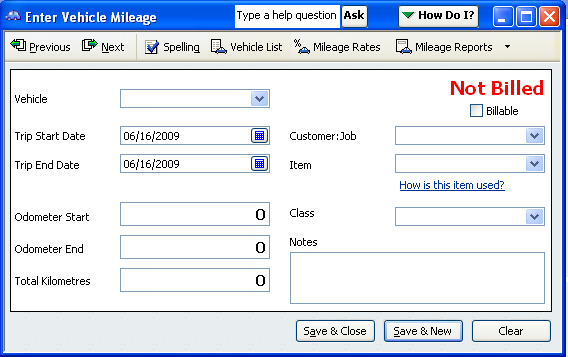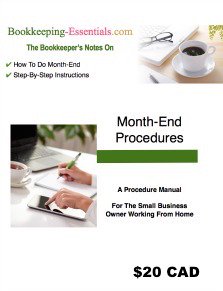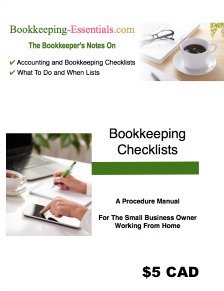Canadian Employee Vehicle Expenses
by L. Kenway BComm CPB Retired
Reimbursement of employee vehicle expenses is a complicated area of the tax act. The rules are very specific. I've taken some of the questions asked in the forum and consolidated the information on this page.
What You'll Find In This Chat

- What is a reasonable per kilometre allowance?
- Employee mileage reimbursement - log or no log?
- Can I just fill an employee's gas tank and pay for their vehicle repairs?
- Are employee auto allowances included in income?
- How do you pay an auto allowance ... through payroll or by separate cheque?
- How do you handle a company credit card for personal vehicle use?
- How low is unreasonable for per km vehicle allowances?
- Do I need to issue a T2200?
- Can I claim operating expenses and repairs even though I received a non-taxable auto allowance?
- How to account for partial kilometres travelled allowance?
- A Bookkeeper's Handy Reference Guide
What does CRA consider to be a reasonable vehicle allowance?
In E&Y's May 2013 newsletter, it discusses CRA's benchmark for a reasonable per kilometre allowance is laid out in Regulation 7306. The article states that In a 2012 technical interpretation the "CRA reconfirmed that the automobile allowance rates used by the Treasury Board of Canada Secretariat (TBCS) are generally considered to be reasonable for purposes of paragraph 6(1)(b) of the Act. This position was first announced in CRA technical interpretation 2007". These rates can sometimes be higher than the rates in Reg. 7306.
The article goes on to state that Reg. 7306 is a guideline for the CRA auditor to assess reasonableness. Other amounts can be considered as reasonable IF they are factually supported.
Reasonable employee auto allowances are tax free ... meaning they are not included in the employee's income.
E&Y states that "while an employee may receive a higher amount, the employer can only deduct the amount computed in accordance with the Reg. 7306 in computing business income".
Employee Mileage Reimbursement - Log or No Log?

What are CRA's rules around the mileage log for employees?
I was asked about CRA's mileage log. Here's the problem the bookkeeper had.
My employer (sole proprietor) pays employees a reasonable non-taxable
mileage reimbursement for taking their car to job sites. (He writes the
cheques and I journalize them).
My problem is that he keeps the
mileage logs and I don't see them, making me wonder if he even has them.
(He states he has them, but doesn't give them to me). I'm wondering how I should be recording these expenses.
Scenario
#1: I was journalizing them as a non-taxable mileage reimbursement
(via a separate cheque and not through payroll) but wondering if I
should instead be doing scenario 2 or 3 below.
Scenario #2:
Should I input those employee reimbursement cheques as Owner's Draw (as I
haven't seen the mileage logs and doubt he has them. I don't want to
put it as an expense - as you always say, "no receipt, no deduction").
The problem is the "Owner's Draw" cheque will be in the employees name.
Is that legal?
Scenario #3: I input those cheques as a taxable
benefit on the employees' payroll. I would have to reverse later if the
mileage logs show up. A lot of extra work but I do believe the employer
doesn't request the logs and don't want to leave it to year end to find
out.
What do you do as a bookkeeper when small business owners don't follow the rules or don't facilitate making your bookkeeping tasks easier instead of harder?
Part of bookkeeping is using your own judgement, so I can't tell you
what to do in a situation like this ... but I will try to give you my thought process on how I
might go about coming up with a solution to the dilemma described above.
I'd be
curious if the bookkeeper dealt only with the owner? Do s/he interact with the
employees at all? Is the bookkeeper self-employed or an employee? Does s/he work at
the place of business or from their home? These details were excluded but may have helped coming up with options to solve the problem.
Scenario #2 is out. The small business owner paid the money to employees not himself through a cheque ... therefore it is not an Owner's Draw by fact.
That leaves scenario 1 and 3 as possibilities.
Take a look at the next section in this chat on Employee Auto Allowances. Follow all the links there. Consider the following:
- Can you provide the business owner with the link (or print out) on the CRA site explaining the documentation required when using a personal vehicle for business?
If the amount per kilometer paid out is in line with the CRA guideline for non-taxable benefits, is the only thing stopping you from feeling comfortable with recording it as a non-taxable benefit the fact that you haven't seen the logs?
Consider recording the cheque as a non-taxable benefit with a memo note that the owner has the mileage log ... if that is all that is bothering you.
However, if it is more than that, here are some questions I might ask to help me make my judgement call.
- Have the employees received the allowance?
- Do they in fact use their personal vehicles to get to the job sites?
- Are they driving to the job sites directly from home or from the employer's work place?
- Does the amount vary and you know the number of kilometers paid or is it a fixed allowance?
Do you see where I am going here? You know what question(s) to ask. Sometimes sole proprietor's mix up the rules around employee mileage reimbursement with incorporated company rules or with their own reimbursement options. They all have different options.
IF
you interact with the employees, can you create a mileage log sheet
that you hand out and ask them to submit to you every month? Would it
provide useful information or backup to the cheques? Would it be
relevant?
IF you know where the employees go and when, do you want to create an ongoing log which would provide some backup in the event of an audit? Bing/Google maps are a great tool to calculate mileage from Point A to Point B. You need to ask yourself if this is in your job description if you are an employee or included in your engagement letter if you are self-employed.
I don't know the answers. I'm not there and don't know the dynamics.
You also want to familiarize yourself with the determining factors around issuing employees a Form T2200 Declaration Conditions of Employment at year-end?
Your responsibility is to do your due diligence.
The owner is the one who will have to provide proof if audited. During
an audit, he may be required to provide the backup documentation. If he
couldn't, CRA could reassess him. The burden of proof is on the owner
as we have a self-assessing tax system.
As a bookkeeper, you are going to have to use your best judgement. Sorry I can't help you more than that.
More information was received on the above problem on employee mileage reimbursement ...
The workers meet at the office and go separate ways in their own vehicles. The owner does not keep a log of appointments.
I solely do the bookkeeping as a hourly paid employee (from my home).
The cents per km he pays I use as a reasonable mileage reimbursement and is under CRA's allowance rates.
When the work is completed I get an invoice dated the final date at
the job site. (There is no way to track mileage & logs. The employees
give them to the employer).
Thank you for clarification about
not putting the mileage reimbursement cheque that is in the employee's
name as Owners Draw. I will continue to record the cheque as a
non-taxable benefit plus as you suggest: include a memo note that the
owner has the mileage log. My worry was with Third Party Liability.
ONE LAST QUESTION: What if the owner was audited with no employee mileage logs?
- Would I reverse the non-taxable mileage reimbursement expense and add the amount to the owners income)? OR
- Would I have to submit adjusting T-4's adding employee (previously
non-taxable) reimbursement as taxable income with the employee &
employer paying CPP, EI, etc? OR
- Maybe it is up to the CRA auditor which route to take during the reassessment?
My response ...small business owners should be aware that due diligence is an audit defense, ignorance of the rules is not. Therefore it always recommended to have a business journal / appointment calendar to support your expenses. It assists in showing that the expense was incurred for earning business income.
The correcting entries required after an audit would depend on how the audit went and what points the auditor won. It definitely is not something you need to worry about right now. Just keep focused on doing your due diligence and using your judgement.
Can't I (the employer) just fill the employee's gas tank when going to a job on my own dime and claim it as a auto fuel expense? Why can't I (the employer) pay to get the employee's vehicle repaired if they need it for work and they can't afford to pay for the repairs themselves?
That would be no, No, NO! As I started the article with, employee vehicle expense reimbursement is a complicated area of the tax act. Instead of trying to find a way around the rules, it is much easier to just setup procedures that meet CRA's requirements.
1. Have the employee keep an auto log to track business trips in their personal vehicle and pay for their own vehicle expenses out of their pocket.
2. Have the employee submit the log at the end of each day, week or month and reimburse based on the CRA tax free mileage reimbursement rate. The rate includes wear and tear on their vehicle so they should have enough funds to repair their own vehicle if it breaks down.
If the employee doesn't have the money to repair their vehicle and you need them at work, then go ahead and pay for the repair (or maintenance) to the vehicle ... but keep the invoice and deduct the cost of the repairs from their next pay cheque. Ensure you have an agreement they sign when they start working for allowing to deduct these types of expenses from their pay cheques.
Edited March 2024 - PWC car expense and benefit guide says "a [taxable] benefit could arise ... if employees are allowed to charge gasoline purchases to a company credit card and are not required to repay the portion that relates to personal use". The same would be applicable to the repairs. If the employee can't afford them and you pay for them, a taxable benefit will arise for the personal use portion. This is why you need the mileage log ... to determine the business vs personal use mileage.
Employee Vehicle Allowances - Are they included in employee income?
I was asked if an employer pays employees a mileage amount for work use of a personal vehicle, should this amount be included as employee income? For example if employee A is paid 50 cents per kilometer (km) by her employer and she drives a total of 1,000 kms in a year for work, should $500 be added to her taxable income?
If the auto allowance paid is within CRA's definition of reasonable, it is tax free to the employee. What is considered reasonable? See CRA's tax free auto allowance rates which are updated annually. The rates are tiered - one amount for km driven up to 5,000 km and a lower rate for over 5,000 km. The rates include GST/HST.
Anything paid over these amounts is a taxable benefit. Once it is a taxable benefit, CRA has an excellent chart which helps you determine if the taxable benefit attracts CPP, EI, income tax withholdings and/or GST/HST.
It is the employer's responsibility to ensure your employees keep an auto log showing their business mileage. To my mind, this means the employee should have to submit a copy of their log or expense report prior to reimbursement. The copy of the log should be attached to your copy of the payout as backup or kept on file.
How do you pay an auto allowance ... through payroll or by separate cheque?
I was asked how should the employee be paid for the mileage - is it paid via payroll for it to be included in the T4? If they are being paid lower than the prescribed rate, can they be paid through AP? How does the employer record this amount? What should the employer do for year end T4 slip?
If an employee met the CRA conditions for a vehicle allowance which is not a taxable benefit, it can be excluded from the employee's income. This means the employer doesn't need to deduct CPP contributions, EI premiums, and income tax from the employee's allowance amount.
It is my understanding that you should pay the tax free vehicle allowance on a separate cheque and not as part of payroll. If you do this, then there will be no problems when it comes time to issue the T4 slips at year-end.
Before you pay the allowance, ensure you receive an auto log or expense report from the employee to back up the amount paid.
How do you handle a company credit card for personal vehicle expenses?
A new freelance bookkeeper asked the following.
I have taken on a new client that operates as a sole proprietorship. The owner has two employees. Each of these employees has a company credit card in their name which they use for fuel and materials (construction).
The previous bookkeeper had never reconciled their credit cards nor entered in any of the expenses, just the payments. I was wanting to reconcile each month but I am confused on what expenses can be claimed as business use?
The vehicles are personal and the owner pays off the credit card each month. Can these expenses be recorded? I would think that the materials purchased at the very least could be expensed? Am I wrong on this? If so what is the correct way to post the credit card expenses?
It is my understanding that if a sole proprietor's employees use their
personal vehicle for business purposes, they should be reimbursed an
auto allowance. There are published tax rate deduction limits for the tax-exempt portion of allowances that CRA considers reasonable. (The link was provided earlier in this chat.)
To
support the allowance paid, it is my understanding that the employer
should require their employees to keep and submit an auto log showing
their business mileage. In my opinion no reimbursements should be made
without the log and it should be kept on file in the event of a CRA
audit.
It is also my understanding that if a company provides company cars to their employees, there are taxable benefits attached to it that must be included in payroll such as standby charges and vehicle operating expenses.
Your boss seems to have cherry picked how he handles reimbursement of the personal use of a business vehicle by an employee.
You
should advise him to seek expert advice from an accountant. This is a
complicated area of the tax act that is almost always audited because it
is low hanging fruit.
On a go forward basis, I would at least try to get the boss to switch to a vehicle allowance supported with an auto log.
The
construction material expenses should be entered as expenses ...
however, the employees need to submit the original receipts as backup in
the event of an audit. You can't properly enter your ITCs if you don't
have the original statement. Credit card statements are not sufficient evidence that a business expense has been incurred.
How low is unreasonable for per Km vehicle allowance?
A bookkeeper says that her employer is wanting to pay his employees 17 cents per km below CRA's auto allowance rates. What might be the minimum he could pay to avoid the CRA ruling that his per km rate is unreasonably low?
On the CRA site at Individuals> Tax return> > Deductions> Employment expenses> Salaried employees> Allowable motor vehicle expenses, there is mention of what an employee can do if they receive an unreasonably low travel allowance:
"Sometimes, your employer will include an unreasonably low allowance as income on your T4 slip even though you do not want to claim any expenses. When this happens, have your employer complete and sign Form T2200, or get a letter from your employer stating that the allowance was unreasonably low. Enter this amount on line 229 of your return."
In CCH's Preparing Your Income Tax Returns, I came across the definition of unreasonable for automobile allowances. It says two conditions must be met to be deemed unreasonably low:
"(1) the allowance is based on kilometers driven in the course of your employment. Presumably it follows from this requirement that you must keep a log ...
(2) No reimbursement for automobile use is provided in addition to your tax-free automobile allowance, other than reimbursement in respect of supplementary business insurance or parking, toll or ferry charges.
If your automobile fails to meet either of these tests, the whole allowance will be considered unreasonable and added to your income. In this case you may deduct your automobile expenses ..."
Marleen of BMCO Income Tax also weighed in on how to handle this. Here's her opinion:
I have several customers who receive below the CRA guideline
reimbursements for km driven while using their personal cars to do their
jobs.
You can enter the fuel, oil, parking, licence, CAA, toll
roads etc? maintenance and repairs, interest paid on loan for the entire
year. [See form T777 Statement of Employment Expenses*]
As long
as you know how much you drove in total and enter how much you drove to
earn income, which is easy to get when you divide the reimbursement by
what they pay you per km. ex. Received $1,935.00 divide by $0.30 = 6,450
km. **
When entering your vehicle expenses [on form T777
Statement of Employment Expenses***], you also have to enter the
reimbursement amount [line 16]. If it cost you more to use your vehicle
than what you received already, the extra amount can [may] be claimed as
a work related expense.
Editor - Comments in square brackets are from the editor.
*
You must keep all your receipts if you are going to claim actual
vehicle expenses, similar to the recordkeeping requirements for a sole
proprietor.
** It is recommended you keep an auto log to prove the miles driven for business purposes. This is a favorite area to audit.
***
The employee must have a T2200 Declaration of Conditions of Employment
issued and signed by their employer before they can make a claim on form
T777. See CRA publication entitled Employment Expenses, chapter 8 -
Motor vehicle expenses> Employment use of a motor vehicle
When do I need to issue a T2200?
An Employee uses their personal vehicle for business use; submits a mileage log
for business kilometers (kms) and gets reimbursed a "reasonable per km rate" so it is
a non-taxable benefit.
Question 1: Does the Employee need a Form T2200 (Declaration of Conditions of Employment)?
Question
2: Can the Employee claim vehicle employment expenses (Form T777) for
the business kms? If yes, I assume the employee would have to reduce the
claim by the total non-taxable reimbursement received under the
rebate, allowance section?
In order for an employee to claim motor vehicle expense for business use
of their personal vehicle, their employer must issue a T2200. Question 2
on the form must be a "YES". Question 5 must also be answered.
As you are aware, motor vehicle allowances are non-taxable if:
1. They are paid based on mileage (a log was used and submitted);
2. The allowance was reasonable (did not exceed CRA's set rates); and
3. No reimbursement was given for operating expenses.
CRA's website clearly states at www.cra-arc.gc.ca> Individuals> Tax return> Deductions> Employment expenses> Salaried employees> that an employee cannot
claim operating expenses for their vehicle if they have received an
allowance. The allowance is meant to cover the vehicle operating costs.
If you go to CRA's Income Tax Interpretation Bulletin IT-522R Vehicle, Travel and Sales Expenses of Employees, and look under Allowance for Travel Expenses - General,
you will see that CRA says in paragraph 41, "An allowance for travel
expenses is not considered unreasonable merely because the employee's
total expenses for business travel exceed the total travel allowances
received in the year".
However, the T777 line 15 suggests otherwise as you pointed out.
If
vehicle expenses were more than the allowance, you could try claiming
them with the allowance reported on line 15 if the four conditions are
met. (See the link above for the four conditions.) Earlier in this chat low km reimbursement was discussed and which you familiarize yourself with.
CRA may
challenge you and you would have to provide documents and logic as to
why you felt the employer's allowance was not reasonable.
Can I claim operating expenses and repairs even though I received a non-taxable auto allowance?
Q. On my T2200 (section 5) my employer used a km rate 20¢ below CRA's published rate allowance. In section 7 of the T2200 it says I don't receive a reimbursement for repairs, expenses, bus fare or
gas.
1. Should I question my employer as to why I'm being paid 20¢ less than the normal rate?
2.
Because I'm not getting the full CRA allowance amount, am I able to claim expenses,
repairs etc even though I received the non-taxable allowance?
A. Check out low employee vehicle allowances.
How do you account for employee vehicle expenses when the allowance received was only for a portion of the kilometres travelled?
E&Y's May 2013 newsletter states that "it is now the CRA’s view that in such a scenario the allowance received must be included in the employee’s income under paragraph 6(1)(b) of the Act. However, the employee may deduct from his or her income, under paragraph 8(1)(h.1) of the Act, automobile travel expenses" in respect of the total kilometers travelled".
This revised administrative position became effective on 15 July 2011. See CRA technical interpretation 2012-0454141C6 for more details.
BOOKKEEPER'S HANDY REFERENCE
Additional Employee Vehicle Expenses Resources
A very useful guide with two logs from PriceWaterhouseCoopers LLP discusses three areas:
- self-employed individuals
- employer supplied automobiles, and
- employee supplied automobiles.
The current year Guide can be found at:
www.pwc.com/ca/en/services/tax/publications/guides-and-books/car-expenses-benefits-guide.html
There are 3 items to download:
- Car expenses and benefits; A tax guide
- Car expenses and benefits; A tax guide - Employee Log
- Car Expenses and Benefits Log - Annual Excel Spreadsheet

It's been great chatting with you .
Your tutor Lake
Enjoy A Tea Break With
Me Today. Let's Chat!
Use the search feature to quickly find the
information you're looking for.
Join Me On Facebook
Help support this site by "liking" me! Here's where I post current information.
Listed Under Websites NOT Local Business.
This website is NOT associated with the business operating in Bonnyville AB.



